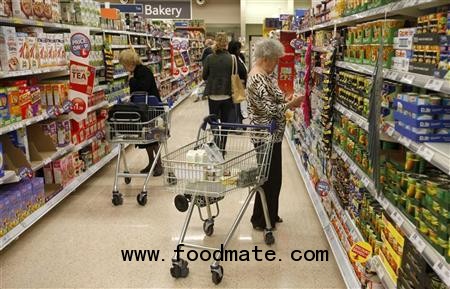
British inflation fell to its lowest in almost three years in September flattered by sharp price rises for gas and electricity a year earlier, official data showed, but factory gate prices rose at a faster pace.
Consumer price inflation may accelerate again in coming months as four of Britain's biggest energy suppliers have announced price rises of around 6 to 9 percent.
The Bank of England and the government have been hoping that falling inflation will ease the squeeze on Britons' budgets and allow them to spend more and support the fragile economy.
The Office for National Statistics said on Tuesday that annual consumer price inflation stood at 2.2 percent last month as forecast - the lowest since November 2009. That compared to 2.5 percent in August.
Separate ONS data showed that factory gate inflation sped up to 2.5 percent on the year versus economists' forecasts for 2.2 percent, pointing to rising pipeline price pressures.
Input prices fell 1.2 percent on the year versus forecasts for a 0.8 percent drop, with the biggest pressure coming from falling costs of imported metals and crude oil.
The September reading for consumer price inflation was flattered by the fact that a sharp rise in energy prices had driven inflation to a peak of 5.2 percent in September 2011.
Britons see rising energy prices as the biggest threat to their standard of living over the coming year, according to a YouGov survey published on Monday.
Higher inflation would also undo some of the improvement in Britons' real disposable income, which posted the sharpest quarterly increase in three years in the second quarter.
Shop price inflation ticked down in September as prices of non-food goods fell at a faster pace while food price inflation stayed at a two-year low, a survey showed earlier this month.
Lower inflation will provide the Bank of England with more leeway to extend its quantitative easing asset purchases when the current 50 billion pound round is completed in November.
However, three of the nine rate-setters have voiced concern over the inflation outlook. While most economists still expect another dose of stimulus, some doubt has crept in due to mounting signs that the economy grew between July and September, exiting recession after three consecutive quarters of contraction.
Retail price inflation - used to calculate returns on index-linked gilts - dropped to 2.6 percent last month from 2.9 percent in August.
The ONS also said that house prices rose 1.8 percent on the year in August, down from a 2 percent increase in July.





